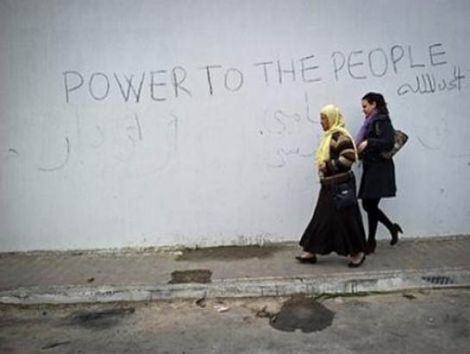This post is a part of a new series of posts which will consist of translations and excerpts from the communiques, statements, pamphlets and other literature from left-wing political parties in the Arab world, especially Tunisia (others as well, Egypt, Algeria and Mauritania in particular). The selections will focus on foreign policy, women’s issues, relations with other political factions (mainly Islamists and other leftist tendencies), ideology, rhetoric and general worldview. The purpose of this series is to put into English elements of the contemporary Arab political discourse which are generally neglected in western and English-language reportage and analysis while the of Islamist tendency receives extensive, if not excessive coverage. The translations in this series should not be taken as this blogger endorsing or promoting the content of particular materials: the objective is to increase access to and understanding of the contemporary Arab left by making its perspectives known, especially in areas of interest and relevance to English-speakers. This series will include both leftist and Arab nationalist [party] documents, statements, communiques, articles and so on. The series will attempt to touch on as many of the main (and interesting) leftist parties as possible.
Below is a translation of an essay (“Marxism and the relationship between religion and state: State secularism”) included in a pamphlet released by the Tunisian Communist Workers Party titled في اللائكية ”On Secularism”.
The essay is itself an excerpt from a longer piece dealing with similar issues. The title of the pamphlet and this essay use the term اللائكية (al-la’ikiyya) derived from laïcité/laïque rather than علمانية (al-’ilmaniyya), the the standard Arabic term for secularism. The implications of this have been discussed earlier in this series. Most of the essays/polemics in “On Secularism” are aggressive and loud critiques of Islamist political thought and leaders like Rachid Ghannouchi. More than one of the essays come from the late 1980s but others are not dated, like “Marxism and the relationship between religion and the state”.
The essay lays out the author’s view of the corrosive influence of religious and religious partisans on science, freedom of conscience, women, class and the most effective means of dealing with the religious problem from a leftist perspective. It makes a strong effort to avoid targeting Islam as a religion and to cast its criticism of religious politics firmly in the realm of materialist political discourse (drawing heavily on Leninist themes), criticizing “Islamism” and “Islamists” as a system of political philosophy and activism, explicitly admitting that the party and the left cannot attempt to ban or eradicate religion from society. The author clearly hopes to avoid conflating opposition to Islamist politics to Islam as practiced by ordinary people (which might alienate potential followers) while at the same time arguing for open-mindedness on religious thought (note that the essay mentions the right to atheism, for example). The forceful arguments on education and minority rights are notable as well. These come in support of the piece’s three main problems with religious government (its negative impact on”scientific renaissance, its suppression of free thought and its restrictions on political freedom).
“Marxism and the relationship between religion and the state” was selected for translation because it represents a relatively brief and straightforward introduction to the party’s ideological and practical stance on religion and politics, in the general sense. It does not deal specifically with Tunisian rivals of the PCOT or secularism in general by name; it discusses the subject in social and historical terms. Thus it gives readers a general idea of the party’s overall stance which is fleshed out further in other (longer) and more specific essays. Additionally it reveals important elements of the party’s attitude toward education in general.
“Marxism and the relationship between religion and the state: State secularism”
LINK: http://www.albadil.org/spip.php?article2338
Date: 12 June, 2011
The issue of the relationship between religion and state is an important point in the controversy between the Tunisian Communist Party and some Islamists on the pages of the newspapers and this is normal given the sensitive nature of this issue. As usual, the party sought to find a formula harmonizing Marxism and religion and through its most rational members expresses its position in an article, which is referred to at the beginning of the text:
“We do not hide the fact that we as Marxists differ with the Islamist trend in vision, philosophy and in our assessment of the benefits of rationality, but we do not ask for the symbols of a secular state, as put forth in Europe where the labor movement that raised this slogan [of secularism] was not alone in resisting the tyranny of the Church and its power over the fate of the people. The matter for us Tunisian communists an abuse of just that. We consider the state to be in the interests of the masses and within these interests is to take care of religious affairs in all that it takes to provide Islamic knowledge in schools and the [state-owned] media, attending to the building of mosques and providing the right atmosphere so that citizens can attend to their religious duties. But what we reject is the religious bullying of anyone on state agencies and deriving leverage from authorizing the classification of citizens as Muslims and heretics of Islam.”
This is the position of the Tunisian Communist Party toward the relationship between religion and the state, the relationship between religion and schools, indeed it is the case that with religion and schools the schools have a religious character to some extent and are only against extremism. I took care of Marxism in the subject of the relationship between religion and schools, and stood clearly and unambiguously for a secular state as well, which means the separation of religion from the state and the separation of the schools from religion, but what does this mean? It means that the state must refrain from interfering in religious issues directly or indirectly, such as by being a religious association or by funding them, refraining from establishing distinctions between citizens on the basis of their religion or limiting their freedom on the same basis, and ensuring their [citizens’] right to believe in any religion while guaranteeing their right to atheism, too.
The separation of school from religion means to make school a place for the emergence of community and the reception of scientific, technical and cultural knowledge without imposing consciousness of this or that religious belief and without taking into account in the teaching of science by considering the position of religions concerning this or that discovery. But does this mean that in the eyes of Marxism to try to prevent the existence of religious beliefs, religious groups, religious practices and religious celebrations and seasons? Never. All that remains but without the state intervening and imposing some patter of believe. [. . .]
A secular state rejects oppression and persecution
Having begun to adopt the banner of communism in a secular state in which the basis of the “bourgeois” banner raised by the bourgeoisie during the revolutionary eighteenth century, from historical fact and theory it is evident, that linking religion and the state inevitably leads to the worst manifestations of oppression and persecution. How?
First: Linking religion and the state stands as a barrier to scientific renaissance because each discovery contradicts the position of religion[s] — how many religions contradict scientific findings — and are considered unbelief, blasphemy and heresy with their authors’ fate being oppression. And everyone knows the fate of “Galileo” which came as a result of his discovery that the earth revolves [around the sun], whereas the Christian Church considered it the center of the universe and that the other planets revolved around it; everyone also knows the positions of the various religious institutions , Christian or Islamic, on the theory of Darwinian evolution, which showed with evidence that humans evolved from anthropoid organisms, even in America the teaching of Darwin and his scientific theory is prevented from being taught in schools and institutions subject to the religious establishment! These are but a few examples of religious opposition to scientific knowledge.
Second: Linking religion to the state also leads to the suppression of freedom of thought because all thinking incompatible with religion, in whole or in part, is regarded by the owner as abuse, thought and knowledge do not leave religious practice and repeat and confirm what is in the “Bible” which turns out to be the sole source of human knowledge. In this is the denial of the evolution of human thought, and sentencing to stagnation and regression. For us in the history of many different religion so many people suffered for their boldness in expressing rational ideas contrary to religious “knowledge”. (e.g., The Arab Ibn Rushd whose books were burned and who was exiled as a result of his ideas introducing materialism to Arab thought.)
Third: The linking of religion and state leads inevitably to the suppression of political freedoms. Why? Because in religion God is the source of legislation and legislation is considered over and done and identifies for the people the principles of economic, social, political and moral behavior, and they need only to follow these principles by following the successor of God on earth, the kind or the Khalif or the Imam whose governance is the rule of God. It thus robs the people of their right in the exercise of legislation in regard to all affairs of their lives, because the status of legislator applies only to God. As Abu Alaa al-Mawdudi, one of the leading intellectuals for the Ikhwan after Sayyid Qutb says regarding the theory of political Islam which is centered on “removing all authority and command from the hands of men [. . .] because God alone is competent [. . .] and since democracy is the rule of the people [. . .] it is not correct to unleash the word democracy on the Islamic state system rather the sincere expression of the word of holy government or theocracy.
It is not therefore surprising to see that, historically, all existing regimes based on the Christian or Islamic religions, participation in its being as an individual is broken. Thus every contradiction to the King or Khalif turns into a contradiction of God and contradiction to God is doomed to painful suffering [. . .]
In the case of a country with multiple religions, the establishment of the state on the basis of religion damages harshly those from minority religions since political rights are distributed on a sectarian basis. It then turns differences in religion, like differences in race and gender and class into the basis for political persecution.
Thus raising the banner of a secular state for humanity (this was done initially in Europe) was the product of a long and arduous struggle between freedom and tyranny, a struggle for which humanity paid a dear price. If this banner is not raised throughout the Arab countries, it is not because the institution of Islam is democratic or because there is no need for the Arabs to separate religion and state but because of backwardness in their countries and the failure of democratic revolutions, bourgeoisie in the eighteenth and nineteenth century until colonization sought to maintain the situation and exploit it for its own uses.
Secularism is a test for political forces
The position on the relationship between religion and the state is a test for democracy or any political force, and it is a true democracy that defends the secular state, and communism, if adhering to this banner, which has been put away by the bourgeoisie in more than one place because it is based on respect for the will of the masses, on democracy and on building the state on a secular basis totally for political liberties and political energies of the people turning them into the master of their fate. What is strange is that the Tunisian Communist Party, which claims to be the standard bearer of Marxism in Tunisia, did not quite live up to the level of the bourgeoisie in the eighteenth century, rebelling in defense of the need for the separation of religious institutions and the state. So then it claims communism and a firm strictness in this situation. But how do you stop Marxism at the limit of raising the banner of a secular state, and that’s enough? No, communism considers the separation of religion from the state as a necessary condition to enable the toiling workers to overcome the illusions of religion because that separation will bring them to the launching of freedom of the thought, will allow the possibility for debate, the possibility for addressing the issue religion and disbelief as purely intellectual weapons as in the saying of Lenin after he had to go into hiding, having been subjected to the worst forms of abuse at the hands of the dominant religious institution of the state.
So as Marxism is concerned religion is considered a private matter for the state but this does not mean it is the duty of communists to refrain from the theoretical struggle against religious thought rather that it must be continued. If Marxism raises the separation of religion and the state as its banner it is easy to understand that a socialist state cannot exist except for as a non-religious state, a secular one.
On this basis it can be said that Marxism stands against positions on the left and among anarchists that want to resolve the issue of religion by means of coercion and considers [. . .] that attacks the freedom of toiling workers and their feelings jeopardizes the their ability to freely debate or be educated, it also stands against the arguments of right-wing opportunists who call for appeasing religion calling it a special issue, and refrain from publishing intellectual material, in this regard Lenin says:
Religion for the Party of proletarian socialism is not a special case. Our party is an association of conscious activists and pioneers fighting for the liberation of the working class. This association (the party) cannot and should not remain without interest in the absence of awareness, ignorance and obscurantism coloring religious belief. We demand the complete separation of church and state in order to fight the fog of religious weapons and purely intellectual weapons alone [. . .]




